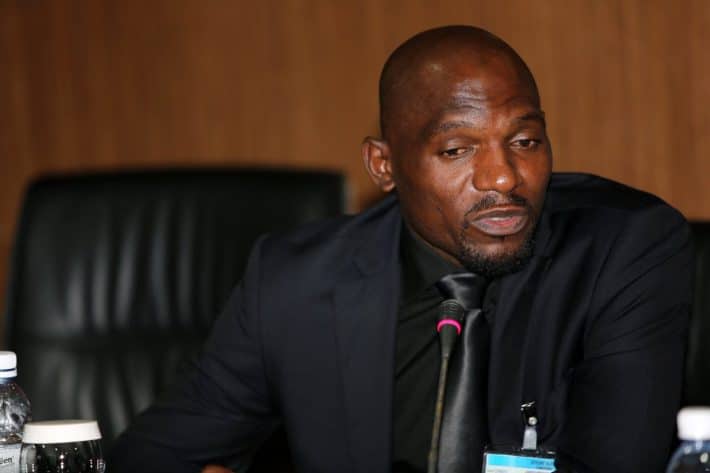Cameroon’s ex-international Geremi Njitap demands action after referee assaults player

Cameroon’s football community has been rocked by a shocking incident in Elite Two, where a referee reportedly headbutted Isohsa FC captain Jefter Arrey after a dispute over a decision.
The footage, which quickly spread across social media, captured the referee striking the stunned player during a heated moment on the pitch.
The violent behaviour has drawn widespread condemnation, yet the Cameroon Football Federation (Fecafoot) has remained silent in the immediate aftermath.
Stepping into the breach, Geremi Njitap—former Cameroon international and current head of the National Union of Cameroonian Footballers (Synafoc)—condemned the act sharply.
He described the incident as “barbaric” and strongly criticised the official, whose role is meant to protect player welfare.
“Synafoc condemns this act of barbarity in the strongest possible terms, especially as it comes from an official entrusted with safeguarding players’ physical integrity,” Njitap said.
He urged an immediate and thorough investigation, calling for “responsibilities to be established, culprits identified and severely punished in accordance with existing regulations.”
Njitap’s intervention adds a new dimension to the controversy, as he has previously clashed with Fecafoot leadership. Earlier this year, President Samuel Eto’o imposed a five-year ban on Geremi from participating in domestic football activities—a move widely viewed as politically motivated given Geremi’s outspoken advocacy for players’ rights and transparency in the federation.
The timing of this incident intensifies the spotlight on Fecafoot. Critics are now calling on the federation to act decisively, not only to discipline the referee but also to restore confidence in the integrity of Cameroon’s refereeing system.
Isohsa FC released a statement acknowledging Arrey’s distress and applauding Njitap’s stand. The club urged Fecafoot to “respond swiftly to show that football standards, ethics and player safety remain non-negotiable.”
The incident has heightened tensions across Cameroon’s football ecosystem. Many players expressed fear and disappointment, questioning why a referee would resort to violence rather than seek assistance when confronted by dissent.
Synafoc’s press release also states that “such conduct damages the reputation of Cameroonian football and must be met with unwavering accountability.” The union is advocating for the appointment of an independent investigation body, separate from Fecafoot, to ensure impartial resolution and to oversee the enforcement of any disciplinary measures.
Local media have reacted strongly, with editorials demanding zero tolerance for violence from match officials. Sports commentators have reaffirmed the referee’s duty to maintain control without resorting to physical confrontation, and many have warned that a failure to act could embolden similar incidents elsewhere.
With the Elite Two season remaining underway, clubs and refereeing associations are concerned about preserving order and fair play. Ensuring safety on the field, particularly for team captains who are often the most visible targets of dissenting voices, is now becomes a central issue.
The coming days will be critical. Fecafoot is expected to issue a statement and begin disciplinary procedures, while Njitap and Synafoc are likely to maintain pressure until transparent measures are implemented.
Their involvement underscores a broader push for accountability in Cameroonian football—a drive that aims to safeguard players, restore confidence in officiating, and reaffirm the sport’s values.
As the country awaits Fecafoot’s response, the message from Synafoc is clear: violence has no place in football, and those entrusted with maintaining order must be held to the highest standards.






